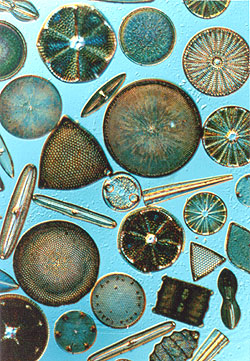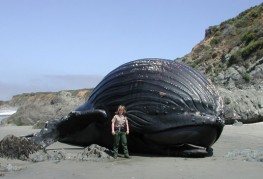 A microscopic sea creature known as a diatom has a shell which does not decompose when it dies. Instead, the shells gradually accumulate on the ocean bottom; and under just the right conditions they form deposits called diatomaceous earth. Such deposits have been found hundreds of feet thick and can be remarkably free of other contaminants. The existence of these deposits seemed a dilemma for young-earth creationists, because it was not believed that such thick deposits could form rapidly.
A microscopic sea creature known as a diatom has a shell which does not decompose when it dies. Instead, the shells gradually accumulate on the ocean bottom; and under just the right conditions they form deposits called diatomaceous earth. Such deposits have been found hundreds of feet thick and can be remarkably free of other contaminants. The existence of these deposits seemed a dilemma for young-earth creationists, because it was not believed that such thick deposits could form rapidly.
A 1976 discovery confirmed that rapid formation of thick diatomaceous earth deposits are possible. At a diatomaceous earth quarry in Lompoc, California, workers of the Dicalite Division of Grefco Corporation uncovered the fossil skeleton of a  The Humpback Whale (Megaptera novaeangliae) is a baleen whale. This fossil is about eighty feet long. Billions of the tiny diatom shells could not have gradually buried the skeleton over millions of years, because the skeleton would not have lasted that long. Dead ocean creatures do not become fossils, because they rot and even their bones disintegrate. In order for a fossil the size of this whale to form, it would have to be buried deeply and quickly. Only quick burial could have sealed the remains from the effects of atmosphere, bacteria, and scavengers. The formation containing this whale fossil had to have been deposited quickly. The better scientists understand the fossil record, the more reasons they have to believe in a worldwide flood and to abandon the old-earth theory.
The Humpback Whale (Megaptera novaeangliae) is a baleen whale. This fossil is about eighty feet long. Billions of the tiny diatom shells could not have gradually buried the skeleton over millions of years, because the skeleton would not have lasted that long. Dead ocean creatures do not become fossils, because they rot and even their bones disintegrate. In order for a fossil the size of this whale to form, it would have to be buried deeply and quickly. Only quick burial could have sealed the remains from the effects of atmosphere, bacteria, and scavengers. The formation containing this whale fossil had to have been deposited quickly. The better scientists understand the fossil record, the more reasons they have to believe in a worldwide flood and to abandon the old-earth theory.
The above document is from It’s a Young World After All, p.81-83 as quoted in A Closer Look At The Evidence by Richard & Tina Kleiss.
“This is what the LORD says, he who made the earth, the LORD who formed it and established it–the LORD is his name: ‘Call to me and I will answer you and tell you great and unsearchable things you do not know.’ ”(Jeremiah 33:2-3)
1026
